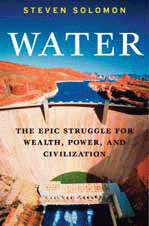SEJournal Online is the digital news magazine of the Society of Environmental Journalists. Learn more about SEJournal Online, including submission, subscription and advertising information.

BookShelf
Water: The Epic Struggle for Wealth, Power, and Civilization
By Steven Solomon
Harper, $27.99
Reviewed by CAROLYN JOHNSEN
In this massive, 608-page book, journalist Steven Solomon traces the history of Earth's civilizations through their uses of water and issues warnings about the effects of water scarcity on contemporary societies.
The history stretches from irrigation in the breadbaskets of the Nile and Mesopotamia to commerce on the Grand Canal in China, to the British defeat of the Spanish Armada, to the invention of the water wheel, to steam power's importance in the Industrial Revolution and to what Solomon calls the "sanitary revolution" of the 19th century.
The author presents an impressive amount of evidence for his thesis that the rise and fall of civilizations have depended largely upon the ability of "hydraulic societies" to manage freshwater and to respond effectively to opportunities for trade and conquest provided by the world's oceans and navigable rivers.
Solomon's energetic delivery generally carries the reader across centuries and continents with great clarity. But occasionally the writing loses energy in his chronicling of sea battles, barbarian invasions and opening of trade routes. So readers will welcome narrative gems about the making of paper and iron, Greek fire (an incendiary weapon) and an industrial espionage case involving silk.
Solomon finds great import in hydraulic innovations and describes them with gusto. Rome's ability to provide freshwater to all classes of citizens, for example, "established a landmark civic standard." Also, "Long-range sea artillery ... has profoundly altered the course of world history" and steam-powered engines "utterly transformed the speed, scale, mobility, and intensity of man's material existence." In just one paragraph Solomon uses the terms "revolution," "watershed turning point," "breakthrough," "quantum jump" and "unprecedented explosion" to describe the impact of an act of the British Parliament that established a sanitary sewer system for London.
Solomon asserts that effective management of water resources led not only to political and commercial power but supported philosophy, art, science, mathematics and democracy. He provides a persuasive amount of evidence and is obviously deeply versed in the historical and contemporary literature on his topic, backing up his text with copious endnotes and bibliographical entries.
Faced with water scarcity and growing populations, however, modern governments aren't doing so well at managing water. Solomon writes, "Despite its growing scarcity and preciousness to life, ironically, water is also man's most misgoverned, inefficiently allocated and profligately wasted natural resource." He raises alarm about the growing distance between water "haves and havenots." He points out that almost one-fifth of the people on Earth "lack access to at least a gallon per day of safe water to drink ..." compared with the 150 gallons per day for all uses available to each person in the United States. Solomon warns that these disparities will inevitably lead to conflict. He quotes a World Bank official who said in 1995, "Many of the wars this century were about oil, but those of the next century will be over water. " Using the past to anticipate the future, Solomon provides important context for anyone trying to understand the origins and impact of contemporary water issues.
SEJ member Carolyn Johnsen teaches science writing at the University of Nebraska-Lincoln. She has edited Taking Science to the People: A Communication Primer for Scientists and Engineers to be published by the University of Nebraska Press in fall 2010.
* From the quarterly newsletter SEJournal, Fall 2010 issue.












 Advertisement
Advertisement 



